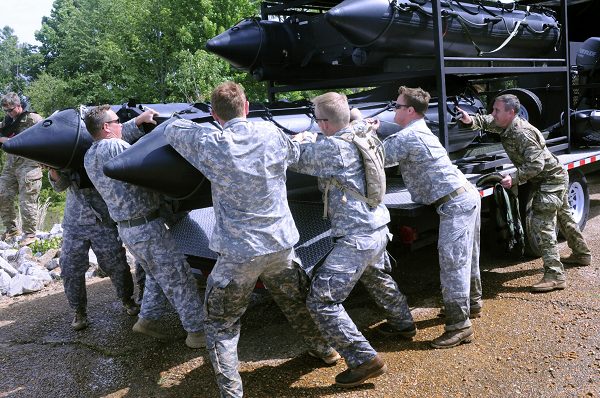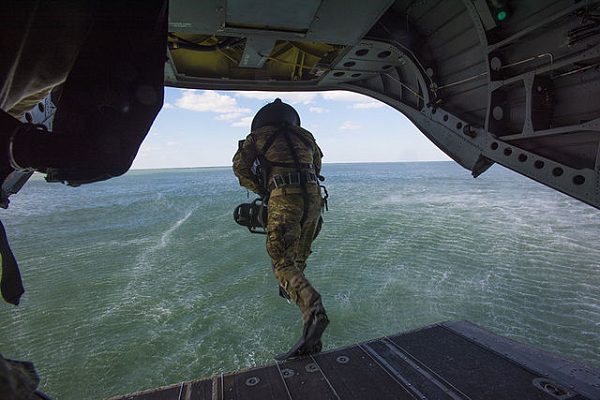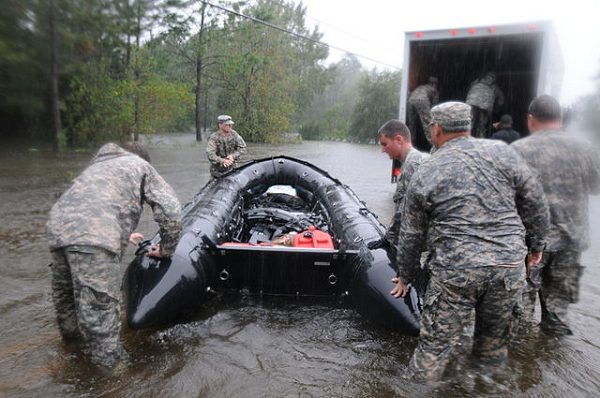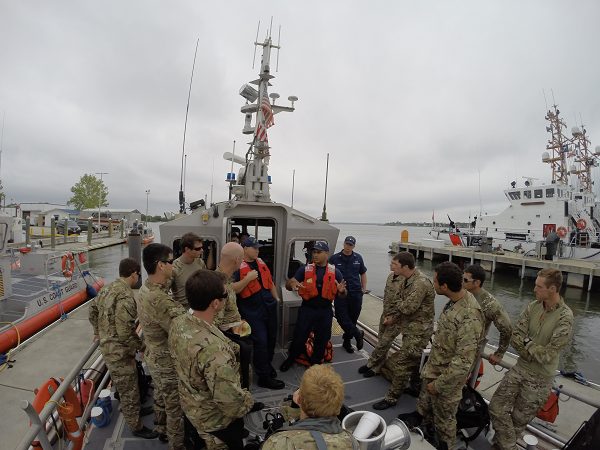The National Guard has its own Special Forces that have the same training as the Active Duty Army Green Berets.
The Special Forces Units are professional soldiers who utilize unconventional methods during times of conflict.
Soldiers in Special Forces are soldiers who embark on missions that no one else can handle.
Therefore, there is a tremendous amount of skill and training that goes into creating soldiers who can handle reaching the objectives of a mission by air, water, and land.
Those who do successfully complete their training and are attached to one of the National Guard’s Special Forces units are lethal soldiers capable of success during dangerous missions.
Jump To A Section
1. Does the National Guard have Special Forces?
2. What Do National Guard Special Forces Do?
3. What are the Requirements for National Guard Special Forces?
4. How can I join the National Guard Special Forces?
5. Training Timeline for the National Guard Special Forces
Frequently Asked Questions (FAQ)
1. Does the National Guard have Special Forces?

The National Guard has two Special Forces groups to consider.
Both units have the same training and provide you with the same qualifications as the Green Berets.
There is the 19th and the 20th Special Forces Group, and both have units across the United States.
Members of both groups are highly trained elite soldiers who will stop at nothing to complete their mission.
19th Special Forces Group
The 19th Special Forces Group is an Airborne group.
This unit is in Utah, but there are Battalions in several states that fall under the 19th Special Forces Group.
The mission of this National Guard Special Forces unit is to train forces to fight in all areas of warfare and to help with threats all over the world.
20th Special Forces Group
The 20th Special Forces Group is also an Airborne group, and the unit is in Birmingham, Alabama.
This group is a part of the United States Southern Command and handles the interests in 32 other countries.
The 20th Special Forces Group has three Battalions in Alabama, Mississippi, and Florida.
Related Article – Green Beret Vs. Navy Seal
2. What Do National Guard Special Forces Do?
The day-to-day operations of the Special Forces stay somewhat of a mystery because they perform hazardous missions using unconventional warfare.
However, they do have types of missions of which the Special Force units are involved.
They respond to counter-terrorism to prevent and deter attacks.
Also, Special Forces do reconnaissance missions behind enemy lines to gather information.
Unconventional warfare requires special training. Therefore, Special Forces are experts in unusual ways of doing their jobs.
Furthermore, the National Guard Special Forces are experts in direct action strikes against enemies.
Lastly, Special Forces help our foreign allies by training their members to protect their citizens.
3. What are the Requirements for National Guard Special Forces?

To qualify for the National Guard Special Forces, you must be active duty or already a soldier in the Army National Guard.
You can sign up for the National Guard with the intention to seek out a MOS that puts you with the Special Forces Units.
Also, you must be between the ages of 20 and 36 years old, and you must be a citizen of the United States.
You must pass several tests and courses as well. Including:
- Your MOS course
- Medical fitness and physical fitness assessment
- Airborne training
- Survival swimming test
Also, your paygrade should be between an E-4 and an E7. If your rank is higher, you should have less than 12 years of time in service (TIS).
Furthermore, you cannot have convictions either as a civilian or by court-martial, and you must not have any terminations on your military record.
Lastly, you will reclassify to different MOS suitable for the National Guard Special Forces, if necessary.
Related Article – Army Vs. Marines
4. How can I join the National Guard Special Forces?
To sign up for the National Guard Special Forces, you can join the National Guard, or you can apply as a prior service member or reclassify if you are currently active duty or in the National Guard.
Depending on your path into the National Guard, there are options for being a member of the National Guard Special Forces.
There are several enlisted MOS options to consider.
18B Special Forces Weapons Sergeant
Weapons sergeant are weapons specialists for the National Guard Special Forces.
They are not only survival experts; they receive training in swimming, scuba diving, and paratrooper.
Also, National Guard Special Forces Weapons Sergeants are skilled in warfare weapons and communication systems.
18C Special Forces Engineer Sergeant
Engineer Sergeants in the National Guard Special Forces are builders who are also experts at warfare involving land mines and munitions.
As an engineer, you handle explosives and demolitions.
Also, you will handle civilian projects as well as projects during times of conflict.
18D Special Forces Medical Sergeant
Special Forces need highly-skilled medical technicians who handle trauma medicine.
As a Medical Sergeant, your training qualifies you to do medical screenings, give medical care to service members, and treat trauma patients in combat situations.
18E Special Forces Communications Sergeant
The National Guard Special Forces Communications Sergeants handle the communication equipment.
If you go into this position, you can expect to handle the use and installation of all communication equipment.
Also, you will handle the supervision of all communication functions during missions.
Related Article – DEVGRU: 7 Things You (probably) Didn’t Know About SEAL Team 6
5. Training Timeline for the National Guard Special Forces

If you are joining the National Guard, you will attend the ten-week basic training course.
If you have prior military experience unrelated to the Army, you will attend the Advanced Individual Training (AIT).
Next, you will go through an evaluation process called the Special Forces Readiness Evaluation to determine if you are suited for the Special Forces.
This evaluation step is lower-stakes and an opportunity to find out if it is a good fit for you and your goals.
Afterward, you will go to Fort Bragg in North Carolina for three weeks of additional assessment.
If you are not already Airborne qualified, you will spend three more weeks at Fort Benning at Airborne School.
Your next step is a Warrior Leader Course, which is back at Fort Bragg for three weeks.
Finally, you are ready for the 53 week Special Forces Qualification Course at Fort Bragg.
Related Article – Green Berets Vs. Army Rangers
Frequently Asked Questions (FAQ)
You likely have some additional questions, and we answered several of them here:
6. What is the age limit for National Guard Special Forces?
While the age limit is between 20 and 36, there are some cases where there is a wavier available. However, availability is based on your qualifications and the needs of your local unit.
7. What is the difference between the National Guard Special Forces vs. Active Duty?
The difference between the National Guard Special Forces and Active Duty is the number of days in training and deployment.
The qualifications and certifications are the same, but the National Guard is a part-time commitment.
On the other hand, Active Duty is a full-time job.
8. Are there any increases in pay or benefits?
The National Guard pays service members based on time in service (TIS) and time in rank (TIR).
However, there are bonuses available for units with urgent needs.
Also, the reenlistment or MOS conversion bonus is available in some cases, as well.
Because the needs of the National Guard shift and are different from state to state and unit to unit, it is best to talk to your local recruiter.
9. How often do National Guard Special Forces deploy?
The Special Forces training is one weekend a month in the National Guard.
This weekend is usually up to four days long.
Also, deployments are typically once every two to three years.
You can expect the deployments to last from 6 to fifteen months.
Related Article – Navy SEAL Training: Basic Underwater Demolition / SEAL (BUD/S)
Conclusion
The elite soldiers that make up the National Guard Special Forces have the same training and qualifications as Active Duty Army Green Berets.
There are two Special Forces Groups in the National Guard, including the 19th and the 20th Special Forces.
Both groups have several units across the United States.
Special Forces soldiers perform unconventional warfare in dangerous missions.
If you are in the Special Forces, you can expect to respond to terrorism directly, with recon missions, and by training our foreign allies to protect themselves.
Your path the National Guard Special Forces might be enlisting with the purpose of choosing a MOS that puts you with one of the Special Forces Units.
Otherwise, you might be prior service or Active Duty Army and transfer into the National Guard.
Whatever your path, you will spend many months in training before you are finished.
However, the time you invest is worthwhile for you and your country.
References:
https://www.nationalguard.com/
- Replacing Dog Tags: 6 Things You Need to Know - June 28, 2024
- Navy OAR Test Study Guide - June 24, 2024
- 10 Best Sniper Movies of all Time - June 20, 2024
Originally posted on September 19, 2020 @ 5:24 pm
Affiliate Disclosure: This post may contain affiliate links. If you click and purchase, I may receive a small commission at no extra cost to you. I only recommend products I have personally vetted. Learn more.

